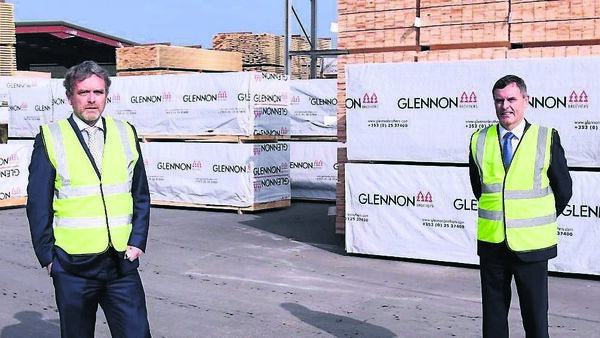Scottish timber has kept Glennon Brothers plants open since November
'Importation of timber is not sustainable from a business perspective' 06/03/2021
Aisling Kiernan - Irish Examiner

Mike (left) and Pat Glennon, joint managing directors of Glennon Brothers, at their timber processing plant near Fermoy, Co Cork.
Since 1913, Glennon Brothers has been manufacturing high-quality timber products at its plants in Longford and Fermoy, and at Windymains Timber in Scotland, supplying both the Irish and UK markets with products for the construction, pallet wood, and fencing industries.
But the company found itself very close to shutting its doors last November, as a result of the forestry licensing crisis in Ireland.
The Covid-19 pandemic didn’t help matters either.
Managing Director Mike Glennon who spoke to the Irish Examiner this week says that were it not for the company’s ability to source logs from Scotland, they would simply not have been able to keep going.
He said the Irish licensing crisis is forcing importation of timber which “is not sustainable from a business perspective”.
“From the sawmill perspective, we had to triple our importing of logs from Scotland in the second half of last year, compared to the previous year, because we didn’t have enough logs here,” explained Mr Glennon.
“We survived by depleting our stocks and continuing to ship over logs from Scotland.
“All of this is fine in an emergency, but it is not sustainable from a business perspective, because of the cost of bringing it into Ireland.
“It’s okay if it’s 5% or 10% of your basket, but when it starts moving into 25% or 35%, the whole economics go out the window, it’s cost prohibitive and doesn’t make sense.”
He says there are two fundamental issues around continuous importation of timber.
One is that there is only a certain part of the UK and Scotland with ‘Pest Free Zone’ status, from which logs can be imported.
The Argyle area in western Scotland is now the source for Glennons.
“Because of Ireland’s pest free status, that is the only area of Scotland that we can import logs from,” Mr Glennon said.
“They also must have a phytosanitary certificate for that process and it is because of this that there is a limit as to how much you can take from Scotland.
“We have had to seriously rely on imports from Scotland for us to get to year-end and to get through this quarter.
“In 2020, if Glennon Brothers didn’t have Scotland, we would have been closed by November.
“And, if we didn’t have the Covid-19 set of circumstances, which took out some production, we would have been closed in October.
“So, without the Scottish logs supply, we were closed. We are no different to other players, and in doing what we had to do, we ran down our stock as well.”
Demand for timber
When it comes to demand for timber, Mr Glennon pointed to the “interesting year” that 2020 was.
“People think of timber in terms of house construction, but they forget the other important part of wood is the supply chain,” he continued.
“90% of all products that move in Ireland move on wooden pallets, and that wood is predominantly supplied by the output of the Irish sawmilling sector.
“So, when there is a problem with forest supply or felling licences, it doesn’t just impact on the construction industry, it also has the potential to impact the supply of goods and services.
“And, for that reason, sawmillers were declared an essential service.”
Some of the products that Glennons manufacture are sold to CJ Sheeran (CJS), Ireland’s largest manufacturer of timber packaging and pallets, which supplies Ireland and the UK’s diverse network of pallet consumers with a premium quality accredited packaging solution.
“The reach of wood and its important role in the supply chain is far greater than the average person realises,” Mr Glennon said.
“The other thing that happened in 2020 was that the demand for wood was greater than we thought.
“People found themselves at home, realised they weren’t going on holidays, because there was nowhere to go, their disposable income increased, and they started spending money on their homes and gardens.
“Hardware stores became very busy, and the demand for wood strengthened.
“Interestingly enough, in the construction side of things, 20,000 houses were built in 2020, which is the same as 2019.”
Future
Despite the launch of Project Woodland by the Department of Agriculture, Food and the Marine last week, and renewed efforts to implement the MacKinnon Report recommendations on licencing, Mike Glennon says there is a long way to go before the forestry industry returns to an even keel in Ireland.
“Right now, I think there are a number of people who invested in forestry that will be very sorry about that investment,” he said.
“Seeing people waiting for two years for a felling licence is absolutely unacceptable.
“People planted forestry in good faith, with the support of the Government, and when the time came to cash in their investment, they weren’t able to do that.
“The licensing issue at the moment does not make sense, and the industry is going to need a huge amount of encouragement and support to regain confidence, because it has been severely damaged.
“The concern we have is that the Government’s own projections on fixing the problem haven’t been met, we are in a very dire state.”
Meanwhile, the Department confirmed to the Irish Examiner that 4,500 licences are currently awaiting approval.
Of these, 1,009 are afforestation applications, while 684 are roads applications, and 2,760 are applications for felling licences.
“The issuing of these licences remains a priority for 2021, and this was confirmed by Minister Hackett as part of the launch of Project Woodlands,” a spokesperson added.
“The backlog will be dealt with by a particular workstream under Project Woodland.
“The three other workstreams are concentrating on a vision for forestry, devising a fit-for-purpose organisational structure, and the fourth on streamlining the licensing process.
“The entire project will be overseen by a project manager and project board and will include an outside perspective, as independent chairs will lead the workstreams, and three external experts will sit on the Board.”
Forestry Industry Ireland (FII), whose members support 12,000 jobs in the €2.3bn timber sector, said the current timber shortage in Ireland “is a result of the licensing backlog” and is forcing sawmillers to import timber, a scenario that needs to be revised.
FII Director Mark McAuley said, “We suggest that Ireland should move away from a licensing model to a regulatory model that does not require a fresh licence for every activity”.
“Stakeholders need to come together and agree the way forward, rather than have different groups pulling in different directions.
“Forestry and timber can make a great positive impact on climate change. If we get it right, it will work for everyone.
“It is a challenging time in the forestry industry, indeed it is in crisis. Ireland has a native forestry industry, and this backlog has effectively curtailed domestic activity, leading to a reliance on imports. This situation needs to be rectified, as importing resources which are native to Ireland has both an economic and environmental impact.”
Mike Glennon said, “There is no sector within the industry that isn’t impacted, and the industry is being seriously undermined by the performance of the Department at every level.
“If you take Coillte, for example, the biggest supplier of logs to the sawmill sector in the Republic of Ireland, which represents close to 80% of the logs that are bought, Coillte sells through two methods, contract and auction.
“In 2019, they had 10 auctions, and in 2020, they had just two, because they didn’t have enough logs to process.
“So, if Coillte, an arm of the State that is very well resourced, is struggling under the weight of the felling licence issue, what hope has a farmer in north Longford or Leitrim?
“They simply haven’t got the resources to come at this massive hurdle.”



